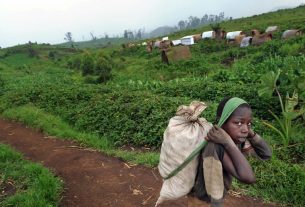On 6 February, a powerful earthquake of 7.8 magnitude – one of the strongest earthquakes in the region in more than 100 years – struck the south-eastern Anatolia region of Türkiye, affecting 11 provinces in Türkiye and 6 governorates in Syria. The earthquake was followed by another powerful 7.5-magnitude quake.
Türkiye’s authorities estimate that 13.5 million people have been affected while at least 8.8 million people were affected in Syria. We met and talked to some of them in the Pazarcık district of Kahramanmaraş – the epicentre of the first earthquake.
EU humanitarian aid team member in Gaziantep, Türkiye hours after the devastating earthquakes. © European Union, 2023 (photographer: Begum Iman)
A group of people affected by the earthquake are gathered around a fire outside of a café – which was damaged but still standing. The garden is full of piles of clothes, and people are trying to sort them into categories to help those coming to pick up some warm clothes.
These donated items are very much needed, given the freezing temperatures in the region. Either because they don’t know if it is safe to stay in their buildings or because they wait by the collapsed buildings hoping for good news from their loved ones under the rubble, almost everyone spends the night outside or in tents.
People affected by the earthquake come and collect clothes and other items they need. © European Union, 2023 (photographer: Barbaros Kayan)
“I have never pictured or imagined that the yard of my café would look like this one day. We used to have concerts and gatherings in this garden, and now we use it to sort out the clothes to help others,” says Cuma, who was born and raised in Pazarcık.
He adds: “Two big earthquakes, back-to-back… I still have difficulty in believing that this is all real.” Before he finished his sentence, another aftershock hit. They took it very calmly since they are now used to these aftershocks.
Cuma, a café owner, helps organising the donations in his garden with other locals. © European Union, 2023 (photographer: Barbaros Kayan)
Cuma’s nephew, 27-year-old Tolga, who lost his cousin, 2-year-old niece and brother-in-law in the earthquake, managed to escape from his severely-damaged house and rescued his parents in the first hours.
“If I had tried to save them while it was still shaking, the furniture would have collapsed on my parents.”
Pekka, the EU civil protection team leader, talking to those affected by the earthquake. © European Union, 2023 (photographer: Barbaros Kayan)
“This is a small town; we have all lost friends or relatives,” says 65-year-old Fatma, a retired teacher.
“We haven’t showered since the earthquake, but we are among the lucky ones; we survived. We are trying to help others by sorting out the donations,” she adds.
“The shake was so strong that I couldn’t take even one step to escape,” says 65-year-old Fatma. © European Union, 2023 (photographer: Lisa Hastert 2023)
Following the request from Türkiye to activate the Civil Protection Mechanism, the EU has mobilised 38 search and rescue and medical teams for Türkiye.
European search and rescue teams, which were deployed immediately via the EU Civil Protection Mechanism, helped the rescue efforts and managed to save 70 lives after working day and night on the disaster sites.
Through the EU Civil Protection Mechanism, Member States also offered shelter materials, medical devices, medicines and a medical evacuation plane to help transport the wounded from affected areas to hospitals within the country.
On 8 February, the EU mobilised fresh funding, €3.5 million for Syria and €3 million for Türkiye. This funding will help meet the immediate needs of people affected by this disaster, such as access to shelter, food, water and sanitation, health, and various items they currently need.
An EU civil protection team is also in Türkiye to support the local and national authorities in coordinating incoming EU assistance.
EU humanitarian aid teams in Türkiye and Syria are on the ground to assess the needs while our humanitarian partners are already providing assistance.
Story by Begum Iman, Information and Communications Assistant for the European Neighbourhood, EU Civil Protection and Humanitarian Aid Operations.
Publication date: 17/02/2023



